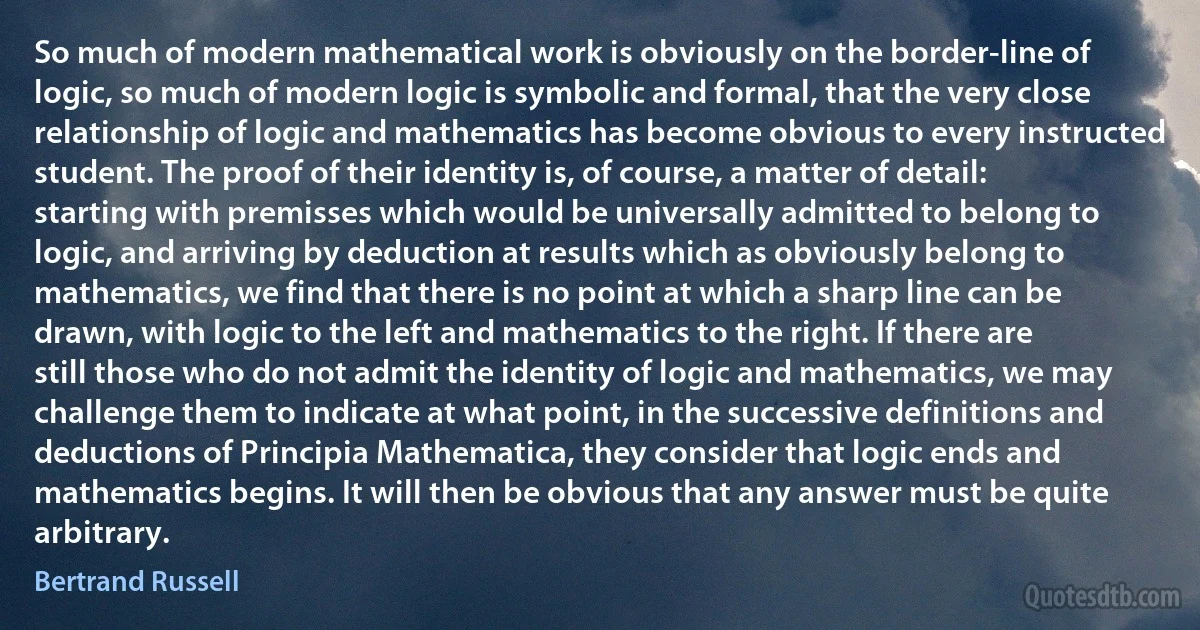
So much of modern mathematical work is obviously on the border-line of logic, so much of modern logic is symbolic and formal, that the very close relationship of logic and mathematics has become obvious to every instructed student. The proof of their identity is, of course, a matter of detail: starting with premisses which would be universally admitted to belong to logic, and arriving by deduction at results which as obviously belong to mathematics, we find that there is no point at which a sharp line can be drawn, with logic to the left and mathematics to the right. If there are still those who do not admit the identity of logic and mathematics, we may challenge them to indicate at what point, in the successive definitions and deductions of Principia Mathematica, they consider that logic ends and mathematics begins. It will then be obvious that any answer must be quite arbitrary.
Bertrand RussellRelated topics
answer arbitrary close course draw find formal left line mathematics matter point principia proof quite right sharp work endsRelated quotes
Welcoming Hegel's idea of reconciliation as akin to his own enterprise of public reason, Rawls drew the line at his vision of the international realm as a domain of violence and anarchy, in which contention between sovereign states was bound to be regulated by war. Habermas's gesture enlisted Hegel, on the contrary, as a patron of cosmopolitan peace. The first could not square his Law of Peoples with the lawlessness of Hegel's states, the second could only enrol Hegel for pacific progress by turning him philosophically inside out. Bobbio, by contrast, could take the measure of Hegel's conception of world history, as a ruthless march of great powers in which successive might founds overarching right, and invoke it in all logic to justify his approval of American imperial violence. Law was born of force, and the maxim of the conqueror – prior in tempore, potior in jure.

Perry Anderson
A true scholarship would examine, and then either accept or reject, with good reason, any new theory which challenges a generally accepted theory admitted to be full of sharp anomalies. However, this has not been the attitude of world scholarship towards our earlier book. The general attitude has been as follows: there is a school of crank scholarship in India which is out to prove, by hook or by crook, that India was the original homeland of the Indo-European family of languages; and the writers of this school deserve to be firmly put in their place. And the best method of doing this is by tarring all scholars who support, or even appear to support, an Indian homeland theory, with one brush; and then pointing out particularly untenable propositions made by one or the other of the scholars so branded together, to prove that all the scholars so named belong to one single school of irrational scholarship.

Shrikant Talageri
As a Line, I say, is looked upon to be the Trace of a Point moving forward, being in some sort divisible by a Point, and may be divided by Motion one Way, viz. as to Length; so Time may be conceiv'd as the Trace of a Moment continually flowing, having some Kind of Divisibility from an Instant, and from a successive Flux, inasmuch as it can be divided some how or other. And like as the Quantity of a Line consists of but one Length following the Motion; so the Quantity of Time pursues but one Succession stretched out as it were in Length, which the Length of the Space moved over shews and determines. We therefore shall always express Time by a right Line; first, indeed, taken or laid down at Pleasure, but whose Parts will exactly answer to the proportionable Parts of Time, as its Points do to the respective Instants of Time, and will aptly serve to represent them. Thus much for Time.

Isaac Barrow
When I look at this as a proposal [i. e. British entry into the Common Market], it is really an extraordinary change. We used to put the Commonwealth first. It is quite obvious now that the Commonwealth comes second. We are going to be closer friends with the Germans, the Italians and the French than we are with the Australians or the Canadians. People are talking about what will happen thirty years hence: but, you know, twenty years ago I should never have imagined that we would be putting, as close friends, the Germans in front of the Canadians, the Australians, the New Zealanders, the Indians or anyone else. That does make for an entire revolution. It is also an entire revolution in the historic position of this country. I am not putting it forward that necessarily old things are right: I should be showing my age too clearly if I did that. It may be they are right; but make no mistake: this is an enormous change.

Clement Attlee
Of the contributions made during the essayist period three call for notice: Weismann deserves mention for his useful work in asking for the proof that "acquired characters" or, to speak more precisely, parental experience can really be transmitted to the offspring. The ocurrence of progressive adaptation by transmission of effects of use had seemed so natural to Darwin and his contemporaries that no proof of the physiological reality of the henomenon was thought necessary. Weismann's challenge revealed the utter inadequacy of the evidence on which the beliefs were based. They are doubtless isolated observations which may be interpreted as favouring the belief in these transmissions, but such meagre indications as exist are by general consent admitted to be too slight to be of much assistance in the attempt to understand how the more complex adaptive mechanisms arose.

William Bateson
